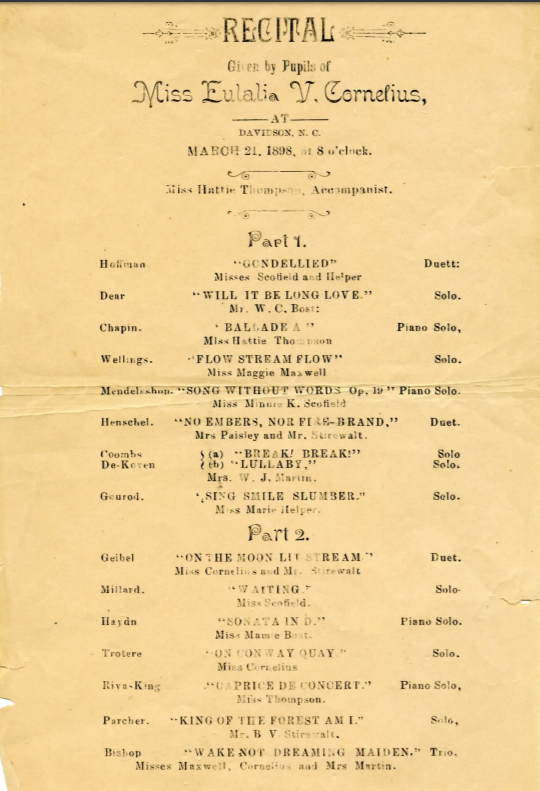In Fall 2019, Archives, Special Collections, & Community (ASCC) had the privilege of working with Dr. Rose Stremlau’s “HIS 306: Women and Gender in U.S. History to 1870” course. Over the course of a semester, students researched the history of women and gender in the greater Davidson, North Carolina area using materials in the Davidson College Archives and other local organizations. The following series of blog posts highlights aspects of their research process.
My name is Brooks Riley, and I am from Charlotte, NC. I am sophomore at Davidson College; I plan on majoring in Psychology and minoring in Gender and Sexuality Studies.
In the latter part of the 1800’s, women entered the realm of teaching. Their nurturing and pious attitudes qualified them to instill the moral values of a patriarchal society in children. However, the sphere of academia only gave full access to male teachers because women were not capable of teaching rigorous or “core” subjects. As a result, women taught subjects that did not confront or interfere with male perceptions of their abilities.

For example, in the town of Davidson, Eulalia Cornelius was a female music teacher. She taught piano and singing lessons and held recitals for the town. Cornelius printed her own pamphlets for recitals which denote that she had an accompanist named Hattie Thompson. Her students were both male and female, some of them married. The specific pamphlet found in the Davidson Archives was from a recital on March 21st, 1898 at 8 o’clock (DC0324s). The Statesville Township census of 1900 furthered our understanding about Cornelius and her position as a female teacher. She was married to a cradle maker; however, she herself is not listed as having a profession. This suggests that female professions, in particular female music teachers, did not qualify as being “real” because they were not listed on the census.
Cornelius’ job as a music teacher gives insight to what women were capable of teaching and how men perceived their abilities. The lack of recording Cornelius’ profession conveys that her job was not sufficient enough to be deemed a job; it may also suggest that her job was not for the economic benefit of her family but instead a hobby. Cornelius is the first documented female teacher in the town of Davidson, and the fact that the subject she taught was music says something about the placement of women in the sphere of academia. Whether it was a lack of trust from men or the idea that women were not as knowledgeably advanced, the subjects that women taught were limited. Music was not a subject that could potentially interfere with the morals of a male-dominated society; it is assumed that Cornelius was able to have her job for this reason. Despite the ill-perceptions and restrictions put on female teachers, women entered into the world of teaching in the late 1800’s and only improved from then on. Women like Cornelius built a sturdy foundation for those to come after her because she put herself into a sphere constructed and tailored to accommodate men.
Citations:
Tolley, Kim. “Music Teachers in the North Carolina Education Market, 1800-1840: How Mrs. Sambourne Earned a “Comfortable Living for Herself and Her Children.” Social Science History 32, no. 1 (Spring, 2008): 75-106. doi:http://dx.doi.org/10.1017/S0145553200013936. http://ezproxy.lib.davidson.edu/login?url=https://search.proquest.com/docview/1991084550?accountid=10427.
DC0324s, Music Program of Eulalia Cornelius in 1898, Davidson College Archives.
1900 Census for Statesville, North Carolina.

Speak Your Mind